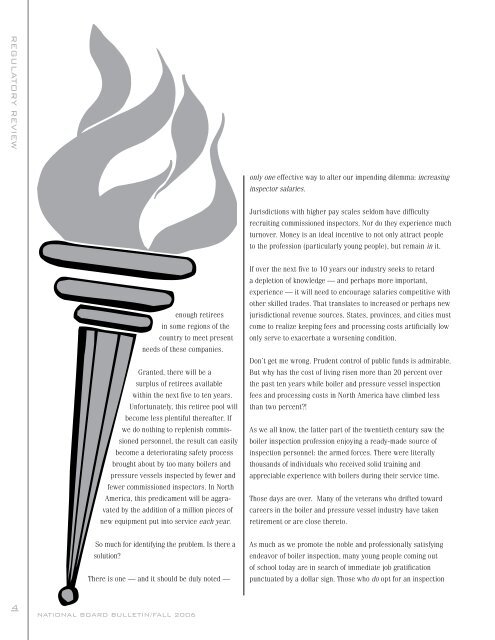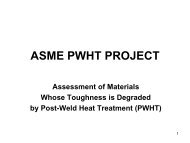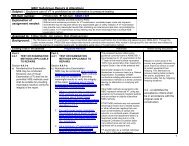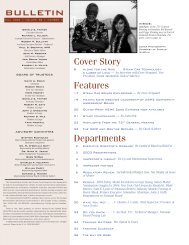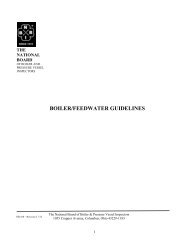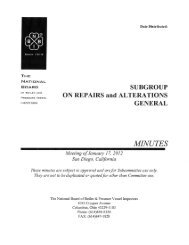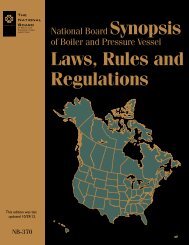bulletin - The National Board of Boiler and Pressure Vessel Inspectors
bulletin - The National Board of Boiler and Pressure Vessel Inspectors
bulletin - The National Board of Boiler and Pressure Vessel Inspectors
Create successful ePaper yourself
Turn your PDF publications into a flip-book with our unique Google optimized e-Paper software.
REGUlATORY REVIEW<br />
4<br />
enough retirees<br />
in some regions <strong>of</strong> the<br />
country to meet present<br />
needs <strong>of</strong> these companies.<br />
Granted, there will be a<br />
surplus <strong>of</strong> retirees available<br />
within the next five to ten years.<br />
Unfortunately, this retiree pool will<br />
become less plentiful thereafter. If<br />
we do nothing to replenish commis-<br />
sioned personnel, the result can easily<br />
become a deteriorating safety process<br />
brought about by too many boilers <strong>and</strong><br />
pressure vessels inspected by fewer <strong>and</strong><br />
fewer commissioned inspectors. In North<br />
America, this predicament will be aggra-<br />
vated by the addition <strong>of</strong> a million pieces <strong>of</strong><br />
new equipment put into service each year.<br />
So much for identifying the problem. Is there a<br />
solution?<br />
<strong>The</strong>re is one — <strong>and</strong> it should be duly noted —<br />
NATIONAl BOARD BUllETIN/FAll 2006<br />
only one effective way to alter our impending dilemma: increasing<br />
inspector salaries.<br />
Jurisdictions with higher pay scales seldom have difficulty<br />
recruiting commissioned inspectors. Nor do they experience much<br />
turnover. Money is an ideal incentive to not only attract people<br />
to the pr<strong>of</strong>ession (particularly young people), but remain in it.<br />
If over the next five to 10 years our industry seeks to retard<br />
a depletion <strong>of</strong> knowledge — <strong>and</strong> perhaps more important,<br />
experience — it will need to encourage salaries competitive with<br />
other skilled trades. That translates to increased or perhaps new<br />
jurisdictional revenue sources. States, provinces, <strong>and</strong> cities must<br />
come to realize keeping fees <strong>and</strong> processing costs artificially low<br />
only serve to exacerbate a worsening condition.<br />
Don’t get me wrong. Prudent control <strong>of</strong> public funds is admirable.<br />
But why has the cost <strong>of</strong> living risen more than 20 percent over<br />
the past ten years while boiler <strong>and</strong> pressure vessel inspection<br />
fees <strong>and</strong> processing costs in North America have climbed less<br />
than two percent?!<br />
As we all know, the latter part <strong>of</strong> the twentieth century saw the<br />
boiler inspection pr<strong>of</strong>ession enjoying a ready-made source <strong>of</strong><br />
inspection personnel: the armed forces. <strong>The</strong>re were literally<br />
thous<strong>and</strong>s <strong>of</strong> individuals who received solid training <strong>and</strong><br />
appreciable experience with boilers during their service time.<br />
Those days are over. Many <strong>of</strong> the veterans who drifted toward<br />
careers in the boiler <strong>and</strong> pressure vessel industry have taken<br />
retirement or are close thereto.<br />
As much as we promote the noble <strong>and</strong> pr<strong>of</strong>essionally satisfying<br />
endeavor <strong>of</strong> boiler inspection, many young people coming out<br />
<strong>of</strong> school today are in search <strong>of</strong> immediate job gratification<br />
punctuated by a dollar sign. Those who do opt for an inspection


